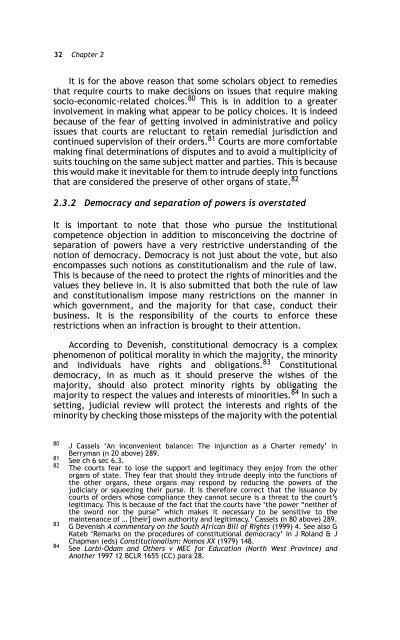LITIGATING SOCIO-ECONOMIC RIGHTS IN SOUTH AFRICA - PULP
LITIGATING SOCIO-ECONOMIC RIGHTS IN SOUTH AFRICA - PULP
LITIGATING SOCIO-ECONOMIC RIGHTS IN SOUTH AFRICA - PULP
Create successful ePaper yourself
Turn your PDF publications into a flip-book with our unique Google optimized e-Paper software.
32 Chapter 2<br />
It is for the above reason that some scholars object to remedies<br />
that require courts to make decisions on issues that require making<br />
socio-economic-related choices. 80 This is in addition to a greater<br />
involvement in making what appear to be policy choices. It is indeed<br />
because of the fear of getting involved in administrative and policy<br />
issues that courts are reluctant to retain remedial jurisdiction and<br />
continued supervision of their orders. 81 Courts are more comfortable<br />
making final determinations of disputes and to avoid a multiplicity of<br />
suits touching on the same subject matter and parties. This is because<br />
this would make it inevitable for them to intrude deeply into functions<br />
that are considered the preserve of other organs of state. 82<br />
2.3.2 Democracy and separation of powers is overstated<br />
It is important to note that those who pursue the institutional<br />
competence objection in addition to misconceiving the doctrine of<br />
separation of powers have a very restrictive understanding of the<br />
notion of democracy. Democracy is not just about the vote, but also<br />
encompasses such notions as constitutionalism and the rule of law.<br />
This is because of the need to protect the rights of minorities and the<br />
values they believe in. It is also submitted that both the rule of law<br />
and constitutionalism impose many restrictions on the manner in<br />
which government, and the majority for that case, conduct their<br />
business. It is the responsibility of the courts to enforce these<br />
restrictions when an infraction is brought to their attention.<br />
According to Devenish, constitutional democracy is a complex<br />
phenomenon of political morality in which the majority, the minority<br />
and individuals have rights and obligations. 83 Constitutional<br />
democracy, in as much as it should preserve the wishes of the<br />
majority, should also protect minority rights by obligating the<br />
majority to respect the values and interests of minorities. 84 In such a<br />
setting, judicial review will protect the interests and rights of the<br />
minority by checking those missteps of the majority with the potential<br />
80 J Cassels ‘An inconvenient balance: The injunction as a Charter remedy’ in<br />
Berryman (n 20 above) 289.<br />
81<br />
See ch 6 sec 6.3.<br />
82 The courts fear to lose the support and legitimacy they enjoy from the other<br />
organs of state. They fear that should they intrude deeply into the functions of<br />
the other organs, these organs may respond by reducing the powers of the<br />
judiciary or squeezing their purse. It is therefore correct that the issuance by<br />
courts of orders whose compliance they cannot secure is a threat to the court’s<br />
legitimacy. This is because of the fact that the courts have ‘the power “neither of<br />
the sword nor the purse” which makes it necessary to be sensitive to the<br />
maintenance of … [their] own authority and legitimacy.’ Cassels (n 80 above) 289.<br />
83<br />
G Devenish A commentary on the South African Bill of Rights (1999) 4. See also G<br />
Kateb ‘Remarks on the procedures of constitutional democracy’ in J Roland & J<br />
Chapman (eds) Constitutionalism: Nomos XX (1979) 148.<br />
84<br />
See Larbi-Odam and Others v MEC for Education (North West Province) and<br />
Another 1997 12 BCLR 1655 (CC) para 28.
















